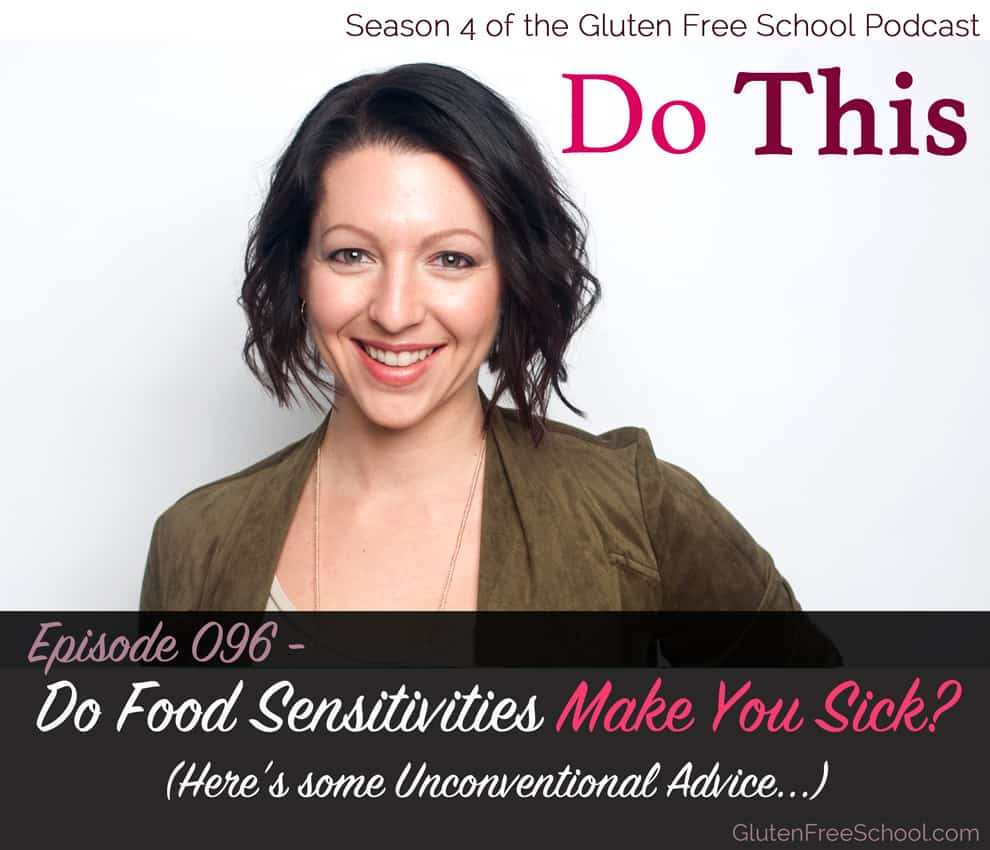
Do food sensitivities make you sick? It’s certainly possible.
There’s a lot of controversy around food sensitivities and if they’re even real!
If you want to know more about what they are (and what they aren’t), I have a great post you can read (HERE).
The reason I bring this topic up today is that in my clinical experience, food sensitivities have been overemphasized. And that ultimately causes some pretty alarming issues, which I hope you can avoid.
Even though tons of articles online as well as functional medicine practitioners act like you can just take these foods out and you’ll get better, that’s not REALLY true.
Removing trigger foods doesn’t solve the underlying problem.
Yes… you may certainly feel better.
But you won’t necessarily BE better.
And that’s the issue here.
With the exception of gluten which has the capacity to alter your gut’s permeability or leakiness, food sensitivities are not a root cause.
They are a symptom.
{Don’t yet know your trigger foods? CLICK HERE to order the at-home food sensitivity test I use in my practice.}
Do food sensitivities make you sick?
 While you’re so focused on what food sensitivities make you sick, another question gets lost in the mix.
While you’re so focused on what food sensitivities make you sick, another question gets lost in the mix.
You should (but may not have even thought to) ask “WHY did I end up with these food sensitivities in the first place?”
Removing them from your diet is a lot like being allergic to poison ivy. It makes sense that you would avoid the wretched plant like the plague.
Just because you aren’t exposed to it on a regular basis and don’t have any rashes right now doesn’t mean that you’re no longer allergic to it.
I highly doubt that you’d go rolling around in a giant patch of it!
The point of functional medicine, as well as functional nutrition, is to ask the questions that ultimately lead to the underlying (root cause) WHY…
Why did this happen?
What caused this system go out of balance?
My experience has shown me that few people (and few practitioners) ask WHY you became sensitive to certain foods in the first place.
And maybe you’ll say “Come on Jen… I’m sensitive to these foods because I have leaky gut.”
Right… but WHY did you end up with a leaky gut in the first place?
That’s the question that must be asked and answered.
 It was the leaky gut after all that allowed you to become increasingly sensitive to additional foods. Ignoring this question means that the other triggers contributing to your gut’s ongoing leakiness are still there.
It was the leaky gut after all that allowed you to become increasingly sensitive to additional foods. Ignoring this question means that the other triggers contributing to your gut’s ongoing leakiness are still there.
And it’s one of the biggest reasons why “leaky gut” kits available online don’t work.
You’ve got to consider the three different gut issues that can potentially answer that question…
1. Gut dysfunction (ie. low stomach acid, slow gut motility)
2. Gut infections (even low-level infections)
3. Gut dysbiosis (ie. candida, SIBO)
And this list is by no means complete.
There can certainly be involvement of other systems that play a role in your gut issues along with lifestyle choices. Excessive stress increases gut permeability as does frequent use of NSAIDs like ibuprofen.
I go more in-depth on the many reasons for leaky gut and causes of food sensitivities in this interview with my friend Pat Flynn who wanted to talk about whether those issues are bogus. It’s a bit more technical of an interview, but if you like to geek out on this stuff, it would be right up your alley!
Are elimination diets making you sick?
 If you know that food sensitivities make you sick, then it makes total sense to avoid them. But merely avoiding them (even being 100% strict) won’t fix the issue.
If you know that food sensitivities make you sick, then it makes total sense to avoid them. But merely avoiding them (even being 100% strict) won’t fix the issue.
What concerns me as a clinical nutritionist is the number of clients I’ve met with over the past couple of years who have taken elimination diets too far.
Their diet has become increasingly limited and they’ve been unable to reintroduce anything successfully. Some practitioners call this “disappearing iceberg diet” syndrome.
And it also contributes to an incredible amount of food fear and shame (because you can’t seem to figure “this” out).
I do believe that elimination diets have a place, but in my experience, they are incredibly overused (and often used for too long) because the underlying problem isn’t always food.
You typically can’t solve non-food problems with diet.
As an example, it’s why the anti-candida diet alone is not effective in helping you beat candida.
You actually need to use anti-fungal agents, support your gut to reseal, and make sure your liver’s natural detoxification systems can actually handle the process so you don’t experience “die off”.
Because the goal should always be to get back to the most varied and diverse diet possible. And that’s why ongoing food sensitivities (especially a situation where they are increasing in number) are begging for you to dig deeper.
Restrictive elimination diets used for a long time can increase the likelihood of nutritional deficiencies making it even harder for your gut to heal.
But what if it’s NOT food sensitivities?
 But not all symptoms that indicate a potential food sensitivity mean that you are in fact sensitive to that food.
But not all symptoms that indicate a potential food sensitivity mean that you are in fact sensitive to that food.
I’ve had clients swear that they’re sensitive to different foods.
For this example, let’s pick cane sugar.
While you can be sensitive to anything, most of my previous clients who thought cane sugar was an issue actually had unfriendly gut bugs that were the root of the symptoms.
Diarrhea, gas, bloating, skin rashes, headaches, brain fog — they’re all non-specific symptoms that could be triggered by unfriendly gut bugs or a food trigger.
So if you ever find yourself utterly frustrated… not knowing what to eat because you seem to react to “everything”…
Step back and ask questions to dive deeper so that you can get to those root causes. And when you’ve done all you can do… ask for help.
Addressing your problem and ongoing symptoms from there is like stacking the deck in your favor.
Finally, you can give your body a real shot to return to a state of healthy balance so you can get back to living.







Here’s my problem, found I may have an infection in my gut yet my primary doc and gi have just blown me off. Now I’m calling around having to lie to try and find a doc to help. I wasn’t sure a liquid diet from the naturopathic doc I went to would be enough to get rid of the infection. Sigh…..not happy.
Hi there! Unfortunately, your experience isn’t unique. The majority of my clients can’t seem to get their doctors to help them. I’m not sure what the “liquid diet” is about as I don’t have access to your case so I cannot comment on that nor what the rationale is for it. To be honest, if you’re struggling to get help locally, there are plenty of practitioners and even clinical nutritionists (like myself) with online practices who work with people all over the place (over the phone or Skype). I’m by no means trying to pitch myself here… you’ve got to find someone whom you trust and feel comfortable with. But just know that you are not limited by your locale. I’ve worked with people all over the US and even as far away as Hong Kong! So do not be discouraged… perhaps it’s time to shift your focus so that you can find someone who can help you 🙂
The timing of this podcast is perfect for me. I resorted to an elimination diet about 2 months ago in an attempt to get to the root of my never-had-before eczema on my face. I’m happy to report that something that I removed (or maybe more than 1 thing) helped clear my skin. In the process, I also did a candida protocol and now I’m working to restore my gut. The issue is, I seem to have developed some type of seasonal allergies that make my face itch. I’m not having the breakouts and the itchiness is minimal, but still present. Another reason I feel that it’s allergies is that I recently went south for vacation and my face didn’t itch, break out, or anything. I ate things that I had previously cut out (some dairy, eggs, nightshades) all without any issues. However on our way home, I could almost tell you the line of demarcation as we entered back into my home state (KY). My face began to itch! What gives? I can’t move to another state! Now what? As always, thanks for your time and commitment to helping others!
Hi Danielle, something that might be worth considering is looking at how much histamine you have in your system. It could be part of the issue that’s triggering this ongoing concern. Obviously restoring the gut is key here because balance there can help reduce triggers further, but that’s where I would look!
How do you know how much histamine you have? Are you talking about the foods I consume or is there a way to actually test/measure the level?
I agree that removing food sensitivities won’t cure the problem. However, what if you are sensitive to various herbs and products that are designed heal dysfunctions. For example, berberis formula is designed to kill fungus bacteria in the gut but I find that the capsules cause flare-ups on my skin. The same with caprylic capsules which cause flareups. Certain essential oils like carrot, celery and geranium that are suppose to support liver functioning cause flare-ups. So what is suppose to heal you causes the problem. Basic vegetables like diakon and ginger for cleansing cause skin rashes. The only saving grace for me is that I can tolerate dairy products. A while ago in a video you recommended protein and vegetable powder smoothies but something in the ingredients caused a rash for me. I have an eczema body. I’m liable to breakout anywhere on the skin. Itching is prevalent everywhere with intolerances. What approach would you recommend for me with my condition?
Hi Cliff, so there are various formulas that can be used to address gut pathogens or dysbiosis… some are single ingredients like caprylic acid as you mentioned. What can happen is that the liver natural detox pathways can be overloaded as the process is either WAY to powerful for what it can handle OR the liver doesn’t have the “ingredients” to deal with the additional burden… one such pathway requires glycine (an amino acid) that can help and I often use that with clients. Some people have very sensitive systems and often have to use the simplest, cleanest ingredients. Protein powders with lots of ingredients are often a red flag and so I look for ones that are as few ingredients as possible and often contain hydrolyzed proteins that require little to no digestion. I certainly don’t know your entire case and can’t give you advice on which way to go as that would be inappropriate in this format.
The issue here is that you have to work with products with few ingredients and considering that you’ve had so many challenges, you may want to consider finding someone to help guide you through the process since it sounds like you’ve had a number of issues.